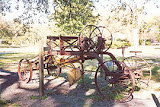Boarding the shuttle on Downtown D&F Tower, built as a general store in 1909 which was the tallest building on the west of Mississippi then, we reached the terminal close to the State Capitol. Everyone seemed to know the famous house of Molly Brown at Pennsylvania at the 17th Street. The structure is identifiable from a distance since it has a Victorian stamp and boasts of its antiquity – unsullied and intact.
The Entry Hall has one of Margaret’s Blackmoor Statues. From here, a staircase takes you to the upper chambers.The parlour, the dining room, the library, sunrooms, bedrooms, study etc are preserved with tapestry and upholstery all of which is not claimed to be original, but ‘very close’. Very well niched are the artifacts and souvenirs, brought by Margaret from far and wide, almost from all corners of the world. “These paintings and photographs of the Titanic and the Boat Number Six are attractions that all the visitors evince keen interest in” the tour guide tells us. The old cooking tools and utensils in the kitchen including a state of the art pressure cooker besides the cutlery are rare antiques meriting a look.
‘Molly’—the calling—though was a later day Hollywood invention yet the amount of marketing this new ‘Avtar’ did, in once again living the legend of the ‘unsinkable Molly’, was remarkable, whether the field was best selling fiction, or movies, or thrillers. Margaret had married a miner J.J. Brown at the age of nineteen, when the man she took by her side was thirty-two. She bore him six children. JJ’s sudden switch over, and exploits in the mining trade, made him rich over-night, and the couple bought a house in1894, which is now the Molly Brown Museum.
The House allows a peep into an era brought alive with exotic flavors from Egypt, China, France, Greece, Belgium and also India. JJ wasn’t much fond of travelling while Margaret had it as a passion besides being an actress and a socialite. During a tour of Europe, Margaret had to board The Titanic at Cherbourg, France, compelled by the circumstance of hearing about her grand child’s suffering, in New York. Her daughter, Helen’s decision to stay back in London, and not boarding The Titanic, on that fateful day of April 1912, made her afford a chance to live till the age of ninety-seven. She died in Greenwich in the year 1993.
Although Margaret Tobin Brown had enough stuff, as reflected in the elements combined and put together in her persona, and as obtained all through her life, before she survived the sinking of The Titanic, yet the way she exploited for good, the later part of her life, particularly the last twenty years, till her death in 1932, for promoting causes of women suffrage, juveniles, labor, maritime laws and human rights, is remarkable.
Befittingly thus then, Molly Brown has very much been part of the ‘Historic Denver’. She fought for women’s rights and organized women’s clubs but was, quite ironically though, ostracized in testifying, during the hearing of The Titanic, since she was a woman. But her courage and conviction were undefeatable and she proved her mettle in all walks of life she stepped in; most of them found in her a harbinger and a leader.
Again it is a big irony of ‘impressions and perceptions’ that when The Titanic sank in the Atlantic, the master of ‘Boat Number Six’, Robert Hichens, deserted the boat, fearing the women in it might not be able to row as fast, to steer out of the suction effect of the ship. It was here that Margret took up cudgels, and goaded her women compatriots, to fight till the finish. She shared her blanket, offered her stockings to other women and put her stoll around the neck of a raft-mate at the same time speaking words of encouragement, like war cries, and believe us, even singing.
They rowed for two hours continuously in dark hours after Molly, who just a little while before was reading a book smugly in Dock B, when the Titanic crashed into the iceberg seconds after the seaman Frederick Fleet rang a bell thrice, from the Crow’s Nest of the ship and shrieked “Iceberg right ahead!” They were all lapped up by the waiting ship Carpathia after the ordeal. All thereafter is history. Her great sense of humour later made her recollect and exclaim "After being brined, salted, and pickled in mid ocean I am now high and dry...!” and that “Water was fine and swimming good..!” She died in New York in 1932 of brain tumor.
Indian Express published an abridged version of this article which is reproduced below....








